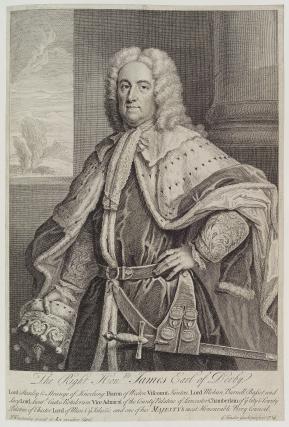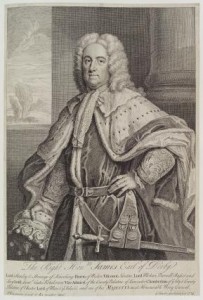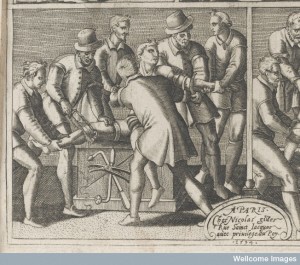
This week I was back in the British Library reading the correspondence of Sir Hans Sloane. Sloane (1660-1753) was a very well-respected Physician working in London and received letters from a variety of people seeking his medical advice and care. If you want to read about the letters (and you can’t get to the library) you can access them through the wonderful database provided by the University of Saskatchewan. You can also follow the wonderful Sloane Letters blog for regular tales from Sloane’s life and letters.

Reading through these letters I was struck by a short series of letters written by James Stanley the Earl of Derby in 1714 about a man named John Getting. These letters demonstrate the medical care that people offered to those around them and show the sad frustrations these people could find themselves up against. From Stanley’s letters it is clear that John Getting was suffering from some form of mental illness, which deteriorated to the point where care could no longer be provided. Although only a brief glimpse into the relationship between these two, it presents a rather sad tale.
In the first letter Stanley wrote to Sloane he outlined that he had taken John Getting home with him in order to care for him:
‘Friday John Getting grown very well as I thought when I was last in Towne I took him whether to live with me finding he had a great mind to it I did it in compassion to his circumstansis but he is now as mad as ever’.1
He concluded by asking Sloane for some ‘directions’ on how to manage this troubled patient. Sloane evidently replied as the next letter opened, ‘I am much obligd to y[o]u for your last letter I believe your directions are very good and would have had effect accordingly but before I sent to y[o]u I had a good dele of blood taken from him and had given him some Antimonial preparation by stelth but not so much as I thought nessecary [sic]’.2
It is already evident at this point that Stanley was struggling to care for John, even with Sloane’s expert directions. They had been reduced to giving the medicine by stealth – without the patient’s knowledge or consent and it is clear that even this was not considered enough. Stanley’s letters reveal a sense of determined perseverance. He was, it would seem, unwilling to give up just because the patient was difficult to manage. His spirits were perhaps also buoyed by a sense that these remedies were working. He concluded this particularly letter by saying
‘whether yt has done him good or no I will not pretend to say but he is now so well yt he has bin these two days in ye garden at work and seeing as well as ever I knew him’.3 This was not enough though to make Stanley think that they were out of the woods, he noted ‘whether he will continue so God knows but how ever so for and so good I am extremly concernd we have given y[o]u so much trouble’.4
The third letter reveals that Stanley’s premonitions were sadly accurate. Writing to Sloane for further directions he revealed the troubles he was having in caring for Getting, ‘I [fi]nd it so hard a matter to manage him as to get him to take any thing yt we [k]now not what to doe how ever will try a littel longer I wish we could tell how [to] manage him so as to make him take [w]hat was nessecary’.5 Evidently Getting’s condition deteriorated further, as in a final letter, Stanley pleaded with Sloane to help him make alternative arrangements for his care,
‘I am sory yt I must trouble y[o]u onset more on ye occasion of John Getting he has so many relapsis and is so ungovernable yt it is impossible for us to manage him here I should be very glad we could get him into Bedlam as I remember y[o]u were onse mentioning to me I should be willing to give some mony to get him in I must desire your assistens onset more for this miserable man which will be a great act of Charety.’6
![The Hospital of Bethlehem [Bedlam] at Moorfields, London Credit: Wellcome Library, London.](https://earlymodernmedicine.com/wp-content/uploads/2014/05/2bf8c9bb620653d7cf6bfa287d43-300x253.jpg)
Credit: Wellcome Library, London.
Although brief these letters demonstrate the care, devotion and persistence that was sometimes given to those suffering from ‘madness’. They also reveal the difficulties both physical and emotional that men and women went through in trying to help those living in their homes. It is unclear from the letters what the outcome of this sad tale was, it can perhaps be assumed that Getting was indeed transferred to the hospital and received further care for more on this head on over to the Sloane letters to read about bed shortages at Bedlam.
________
1.Sloane MS 4075, fol. 62.
2. Sloane MS 4075, fol. 64
3. Ibid.
4. Ibid.
5.. Sloane MS 4075, fol. 66
6. Sloane MS 4075, fol. 67.
7. http://www.sciencemuseum.org.uk/broughttolife/techniques/bethlemroyalhospital.aspx
8. Ibid.
9. Ibid.
© Copyright Jennifer Evans, all rights reserved

Thanks for posting details of such an interesting site! I especially like the letter about the sloath…
Lisa’s Blog on the Sloane letters is wonderful – it paints the picture of such a colourful life and he was involved in so many interesting discussions.
I’ve always been interested in these first person accounts of the care of the severely mentally ill. I was the last librarian for a large psychiatric hospital which trained resident physicians. Even in the era of psychotropics it is still two steps forward, three back. One wonders at the political decisions which add to the misery of many.